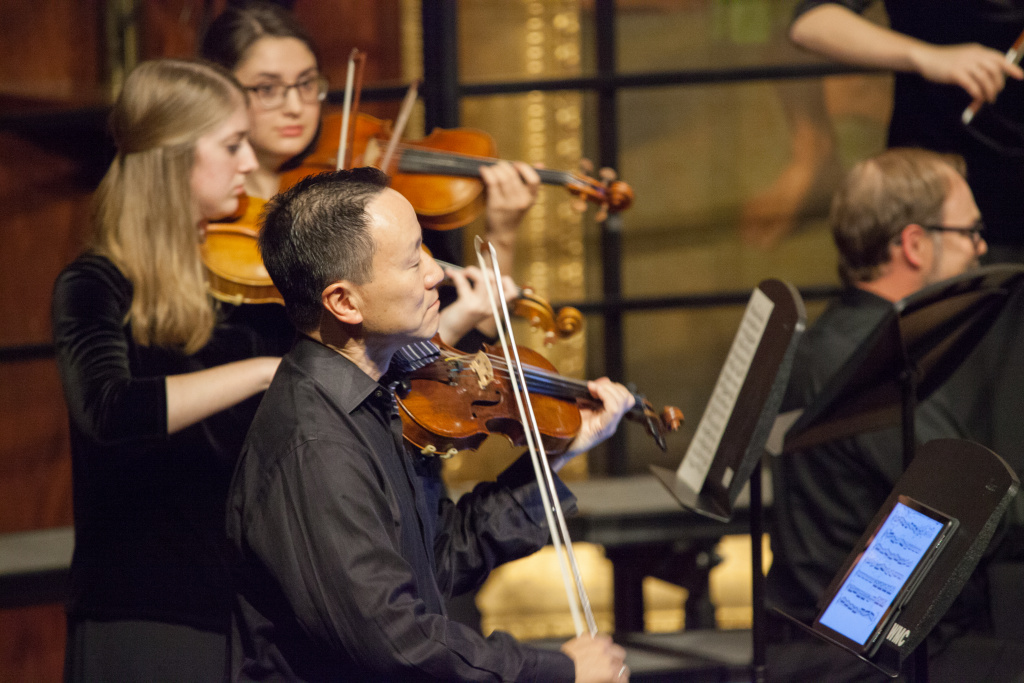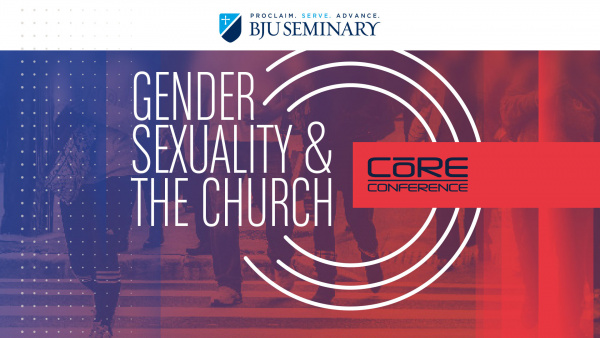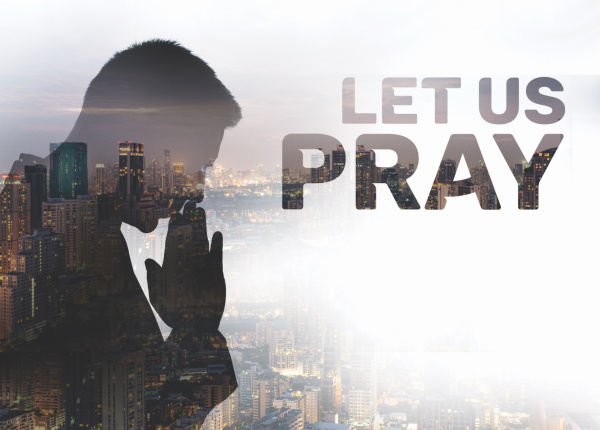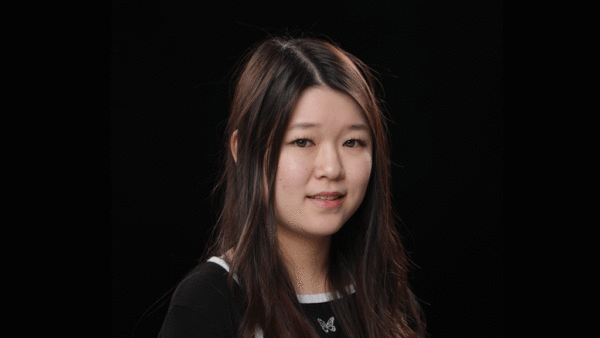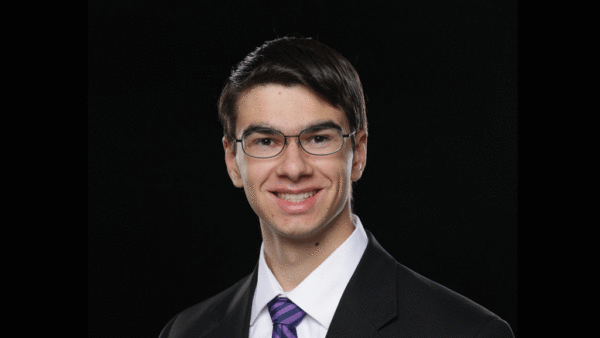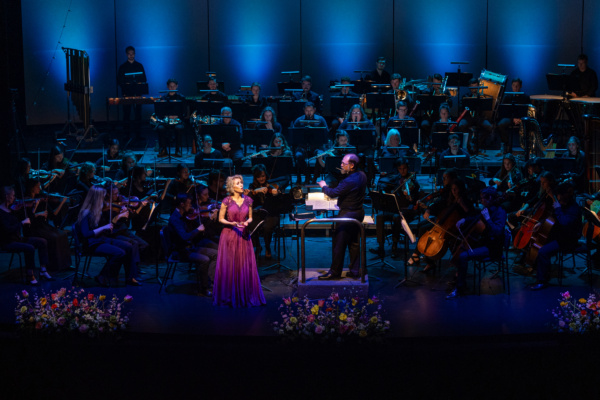You’ve heard it in the dentist’s office, in feature films, at weddings and likely the local supermarket. Vivaldi’s expressive The Four Seasons is as familiar as the distinct quarters of the calendar year it represents.
Yet, David Kim, concertmaster of The Philadelphia Orchestra, incorporates a brief pre-concert tutorial of the four concerti when he performs as a concert soloist.
“It is something that I talk to the audience about before I play a note because it’s four seasons with each season having three movements, and yet within each movement there are slow sections, fast sections, contemplative sections,” he said. “The audience recognizes so much of what they’re hearing because in one form or another most of these tunes have become part of pop culture. But they never know when to clap, what’s going on, so I try to give them a little context.”
On January 31, in the intimate and inspiring setting of War Memorial Chapel, Kim will be joined onstage by members of the BJU Symphony Orchestra, under the direction of Michael Moore, to perform Antonio Vivaldi’s tour de force.
Tickets are $10 for the public and free for BJU students, who are encouraged to secure a ticket with their ID ahead of the concert date. Proceeds benefit scholarships for BJU music majors.
Kim will also conduct a masterclass at 4 p.m. January 30 in War Memorial Chapel. It is free and open to the public.
Bringing together technology, history
Published in 1725 as the first four concerti of Opus 8, with accompanying sonnets that lent insight about the sounds of nature in the individual seasons that the composer intended the music to evoke, The Four Seasons is the best-known work of Vivaldi’s more than 200 concertos for violin and 770 overall.
“Vivaldi was such a rock star in his time, such a genius, so he uses different techniques on the violin to convey these wonderful images like running on ice and your teeth chattering, hunters chasing a wounded deer, birds and thunder, lightning,” Kim said. “All those things make it the perfect combination to create this wonderful performance.
“Vivaldi hit it out of the park. It’s like Handel’s Messiah or Beethoven’s Fifth Symphony; it’s just one of those landmark works that transcends everything.”
Much like the dichotomy of the seasons that nonetheless coalesce, Kim marries technology and history onstage as he reads the score on his iPad while playing a 1757 J.B. Guadagnini violin—manufactured 16 years after Vivaldi’s death—on loan from The Philadelphia Orchestra.
God provides a different path
Kim is closing in on 20 years as concertmaster of “The Fabulous Philadelphians” though he didn’t envision a career trajectory that led to an orchestra position. Bolstered by prizes at the prestigious Tchaikovsky Competition in 1986 and the Indianapolis Violin Competition in 1990, the prodigy envisioned touring as a soloist. But God had a different path for Kim, who lived in Columbia, South Carolina, for a portion of his childhood.
When opportunities began drying up, he auditioned for nine orchestras in an 18-month period.
Kim was the associate concertmaster of the Dallas Symphony Orchestra for a year when he won the coveted position in Philadelphia. In the intervening years, he’s toured extensively with the orchestra and as a soloist, recorded discs and for 20 years was artistic director of the Kingston (Rhode Island) Chamber Music Festival, among other ventures. His journey through the valleys, however, was not finished.
“The Lord teaches me valuable lessons all the time and it’s pretty unpleasant and humiliating and keeps you humble,” said Kim, who said he “officially came to faith” in 2002. “I know His plan is so far beyond my understanding that I need to embrace it and it’s all part of His plan, but it’s so hard to see that when you’re in the middle of it.”
Learning through faith
Concurrently focused and relaxed in an interview, much like he is on stage, Kim relays the challenges of such a high-profile position with a celebrated orchestra. Simultaneously, he’s a liaison between management and orchestra members, fundraiser, public/media relations and marketing contributor, professional performer, and much more.
“During those difficult times, especially in those first seven to eight years I was in the orchestra, it was just miserable,” he said. “I made it difficult for myself. People around me made it difficult. Without having come to faith and redirecting my focus to the Lord, without my wife’s prayers, guidance and steady hand during this turbulence, I think I would have gone to another orchestra or maybe had a nervous breakdown.
“As I continue in the job and start to see on the horizon end points of my career, I still learn stuff all the time. It’s the most humbling experience because every day people are telling you how great you are yet it’s so easy to lose sight of trying to be a humble person and realize that I’m so flawed and continue to need to learn. It keeps me on my toes. Even more than the musical side of it, it’s the human aspect I continue to learn.”
Like coming home
Of course, there are inherent perks with the position of concertmaster with The Philadelphia Orchestra, and Kim doesn’t diminish the opportunities he’s had to perform, travel, teach and lead over the past two decades. Among his favorite stops is BJU.
Kim, 55, is a regular guest artist at the University, and he is looking forward to performing at War Memorial Chapel and visiting with longtime friends on campus.
“The chapel is so intimate and so beautiful. What I enjoy most about performing there is that my colleagues in the orchestra, the students and faculty are close and it’s really like chamber music. It’s really not a concerto piece with a soloist, but it truly is chamber music. Michael Moore will be playing the harpsichord part, which is colorful and delightful. All of us will be having a great, big chamber music party onstage.
“I really feel at home on campus. I am so grateful that I can come back and share my faith and be refreshed in my faith, be inspired at a place like BJU, where I came the first time when I was 12 years old with my mom,” he said. “All these decades later I get to come back and I look forward to every part of my visit. Every element of my time there is a delight.”


